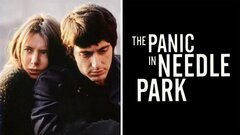Joan Didion

Writer
Birth Date: December 5, 1934
Death Date: December 23, 2021 — 87 years old
Birth Place: Sacramento, California
Spouses: John Gregory Dunne
One of the most highly regarded chroniclers of postwar American history, as well as a celebrated novelist and screenwriter, Joan Didion examined the country's cultural upheavals through precise, unflinching reportage of life in Southern California in such acclaimed works as Slouching Towards Bethlehem (1968), The White Album (1979) and After Henry (1992), as well as the novels Play It As It Lays (1970) and Where I Was From (2003). Didion's observations on California and America as a whole contrasted the golden ideal of the Golden State's past with its convoluted, often fractured present while also detailing her own personal issues, which were intertwined within the narrative. Her approach made her a key figure in the "New Journalism" movement, which filtered the author's feelings and experiences through the context of their subjects.
Didion's potent voice also spawned a successful screenwriting career with her husband, author John Gregory Dunne, for such films as "The Panic in Needle Park" (1971), "A Star is Born" (1976) and "Up Close & Personal" (1996). Dunne's death and their daughter's illness in 2003 later inspired her most personal work, The Year of Magical Thinking (2005), which became a Broadway play in 2007. Didion's extraordinary body of work, detailed over a five-decade career, made her one of the most acclaimed American writers of the late 20th century and beyond.
Born Dec. 5, 1934 in Sacramento, CA, Joan Didion was the daughter of Army Air Corps officer Frank Reese and his wife, Eduene Didion. She spent much of her adolescence in transit, as her father was relocated numerous times due to his military service. By the close of World War II, they had returned to Sacramento, where Didion developed a voracious appetite for reading, especially biographies and the novels of Ernest Hemingway, whose writing would wield the greatest influence over her subsequent works. Shortly before graduating from the University of California, Berkeley in 1956, she won an essay contest sponsored by Vogue which earned her a position as an intern at the magazine. Over the course of the next two years, Didion quickly progressed from research assistant to copywriter and finally associate editor, while also contributing book and film reviews to Mademoiselle and The National Review.
In 1963, she published her first novel, Run, River, which viewed the history of California through the prism of a crumbling marriage between two descendants of its early pioneers. Though it received critical praise, the book sold poorly, and after marrying novelist and journalist John Gregory Dunne in 1964, she returned to California for what was initially viewed as a six-month stay. The couple would remain there for the next two decades, which gave them a wealth of material for their respective work.
In 1968, Didion published Slouching Towards Bethlehem, a collection of essays about the darker side of the San Francisco counterculture scene written for The Saturday Evening Post and other magazines. Widely praised during its release, the book was heralded as a key publication in the "New Journalism" movement, which utilized a subjective, quasi-fictional approach to its subjects, focusing as much on the author's actions and feelings about a subject as the facts of the article itself. The success of Slouching Towards Bethlehem placed Didion in a league with other "New Journalism" proponents, including Norman Mailer, Truman Capote, Tom Wolfe, Gore Vidal and Hunter S. Thompson. She followed it with a second novel, Play It As It Lays, which followed a cadre of rootless fringe figures in the entertainment industry. The following year, Didion and Dunne entered the industry itself with the screenplay for "Panic in Needle Park" (1971), a relentlessly grim study of two addicts, played by Al Pacino and Kitty Winn. The following year, they penned the script for a film adaptation of Play It As It Lays for director Frank Perry.
A disastrous trip to a film festival in Colombia served as the inspiration for her next novel, A Book of Common Prayer (1977), which addressed issues of alienation and lost faith in a story about two women's search for meaning and connection in a fictional Central American country. Didion would focus on the region in several subsequent efforts, including the 1983 essay Salvador and the novel The Last Thing He Wanted (1996). After co-writing the script for the Barbra Streisand remake of "A Star is Born" (1976), she then gave her final eulogy for Southern California in the late 1960s with The White Album (1979), a second collection of articles concerning, among other subjects, a critical eye on the growing women's movement, the Tate-LaBianca killings, the Black Panther Party, and Didion's own health and psychological issues during the period, which culminated in a stay at a mental health facility. Didion then shifted her focus to world matters for much of the 1980s, examining the oppressive political climate of Latin America in Salvador and America's colonial impulses in Democracy (1984), a fictional romantic drama in which she appeared as one of the main characters. With Dunne, Didion also wrote the script for Ulu Grosbard's "True Confessions" (1981), a period thriller with Robert De Niro and Robert Duvall as siblings - one a priest, the other a detective - involved in a Black Dahlia-esque murder in postwar Los Angeles.
After returning with Dunne to New York in the mid-1980s, Didion penned Miami (1987), a series of essays about the Cuban population in the titular Florida city. After Henry (1992), a collection of essays dedicated to her late friend and editor Henry Robbins, found her revisiting California as ground zero subject matter of her early work, including examinations of Patty Hearst, Los Angeles Mayor Tom Bradley, and a drug murder with connections to Francis Ford Coppola's film "The Cotton Club" (1984), as well as an overview of Ronald Reagan's presidency. A pair of essay collections, Political Fictions and Where I Was From, which concerned the history of California, followed in 2001 and 2003, respectively. During this period, Didion and Dunne labored for an eight-year period on a film script based on Golden Girl, a biography of news reporter Jessica Savitch, whose meteoric ascent was cut short by drug and mental issues before her death in a 1983 car accident. As detailed in Dunne's book about screenwriting, Monster: Living Off the Big Screen (1997), the script was put through so many changes by executives at Walt Disney Pictures that the end result, the 1996 film "Up Close & Personal," bore not only little resemblance to their original idea but also had few connections to Savitch's own story.
In 2003, Didion's adopted daughter, Quintana, was hospitalized with pneumonia that developed into septic shock that left her comatose. Shortly after returning from the hospital in October of that year, Dunne suffered a fatal heart attack in their New York apartment. Though Quintana eventually recovered enough to attend her father's funeral, she later suffered a massive hematoma that required extensive brain surgery. The twin tragedies formed the basis for her 2005 book The Year of Magical Thinking, which detailed her process of grieving for her husband while also contending with her daughter's illness. It was widely received with positive notices and earned Didion the National Book Award for Nonfiction, as well as a Pulitzer Prize nomination for Biography/Non-Fiction. Sadly, Quintana died shortly after the book's release; her passing would be chronicled in the 2011 book Blue Nights. Didion then wrote a theatrical adaptation of Magical Thinking, which became a celebrated one-woman play starring Vanessa Redgrave. The production opened on Broadway in 2007 and was later followed by productions in Sydney, Australia, Chicago and France, with Fanny Ardant in the lead. That same year, Didion received the Medal for Distinguished Contribution to American Letters from the National Book Foundation, as well as the Evelyn F. Burkey Award from the Writer Guild of America. In 2009 and 2011, she was awarded honorary doctorates from Harvard and Yale, respectively. Joan Didion died on December 23, 2021 in Manhattan, NY at the age of 87.
Credits

Let Me Tell You What I Mean: A New Collection of Essays by Joan Didion

Joan Didion: The Center Will Not HoldStream

Up Close & Personal

Nešto sasvim osobno

Shotgun Freeway: Drives Through Lost L.A.

A Star is BornStream









